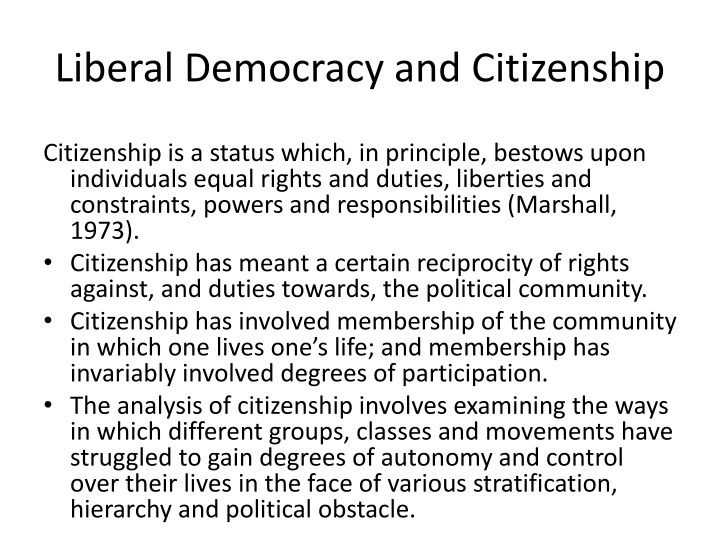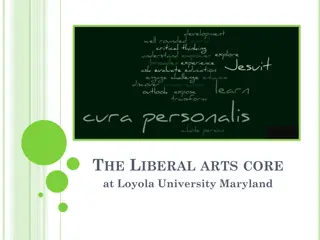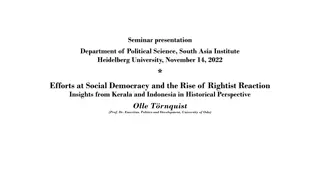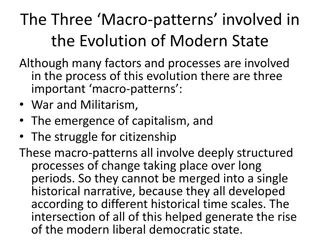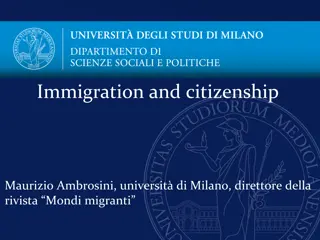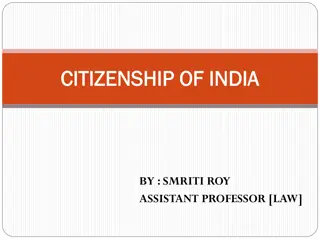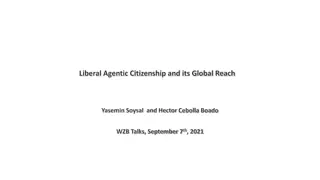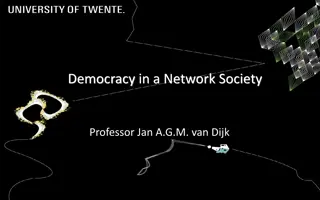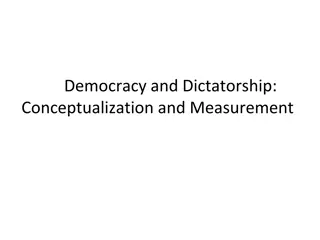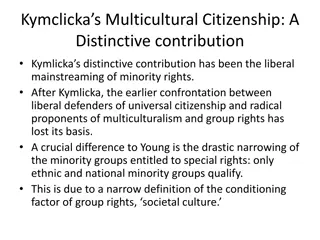Evolution of Citizenship in Liberal Democracy
Citizenship within liberal democracy entails equal rights, duties, liberties, and constraints for individuals within a political community. The entrenchment of civil and political rights has shaped the struggle for membership and participation in political communities. Civil rights, essential for individual autonomy, emerged in the 18th century, while political rights gradually guaranteed participation in political power. The development of citizenship sought equal worth and opportunity for individuals, encompassing not only political but also social rights.
Download Presentation

Please find below an Image/Link to download the presentation.
The content on the website is provided AS IS for your information and personal use only. It may not be sold, licensed, or shared on other websites without obtaining consent from the author.If you encounter any issues during the download, it is possible that the publisher has removed the file from their server.
You are allowed to download the files provided on this website for personal or commercial use, subject to the condition that they are used lawfully. All files are the property of their respective owners.
The content on the website is provided AS IS for your information and personal use only. It may not be sold, licensed, or shared on other websites without obtaining consent from the author.
E N D
Presentation Transcript
Liberal Democracy and Citizenship Citizenship is a status which, in principle, bestows upon individuals equal rights and duties, liberties and constraints, powers and responsibilities (Marshall, 1973). Citizenship has meant a certain reciprocity of rights against, and duties towards, the political community. Citizenship has involved membership of the community in which one lives one s life; and membership has invariably involved degrees of participation. The analysis of citizenship involves examining the ways in which different groups, classes and movements have struggled to gain degrees of autonomy and control over their lives in the face of various stratification, hierarchy and political obstacle.
Entrenchment of Civil and Political Rights Through out the formative phase of the modern state, the struggle for membership in the political community has largely been synonymous with the attempt to establish a form of popular sovereignty through the entrenchment of civil and political rights. a) Civil Rights: Rights which are necessary for the establishment of individual autonomy, including liberty of the person, freedom of speech, thought and faith, right to be treated equally with others before the law-The eighteenth century was the main developmental phase for civil rights in Britain and the United States, when the rights of the liberty of the individual, and full and equal justice before the law became established. i. Civil rights created new freedoms. While such freedoms threatened many traditional forms of power and inequality, they did not strain the new forms of inequalities created by the emergence of the competitive
Civil and Political Rights (contd.) ii. The new rights allowed each person who enjoyed these rights the power to engage as an independent agent in economic competition; they created individuals who were free and equal in status , a status which was the foundation of modern contract. b) Political Rights: The establishment of civil rights in Britain, the United States and else where was a significant step in the development of political rights. i. Those elements of rights which create the possibility of participation in the exercise of political power as a member of a political association, or as an elector of the members of such an association ( although political rights emerged in the late 18th century in some countries-for instance in Sweden-their entrenchment belongs to the 19thand early 20thcenturies). ii. Political rights were gradually recognized as indispensable to guaranteeing individual freedom on the ground that government must, to avoid abuse, be directly accountable to an electorate called upon regularly to decide whether its objectives have been met.
Political Rights (contd.) iii) The establishment of political liberty involved a process whereby the political rights which had previously been the monopoly of the privileged few were extended to the adult population as a whole- the rise of trade-union movement and of the labour movement in alliance with sectors of the middle classes was a critical factor in the development of political citizenship (alongside the struggles for women s suffrage) iv) Thus, the search for citizenship became the search for the conditions under which individuals could enjoy equal worth and equal opportunity. This set the tone for the struggle not only over the enactment of political rights but over social rights as well.
Social Rights or Social Citizenship With the achievement of universal franchise in some countries, the organized working class was able to use its political strength to help combat social inequalities and to consolidate some social or welfare gains as rights. However, this strength was rarely sufficient to push through the decisive, structural reforms which created welfare institutions. In fact, many welfare institutions were propelled primarily by ambitious politicians and visionary civil servants , as a means in part to promote national solidarity. It was not until the late 19thand 20thcenturies that social rights in their form were entrenched; that is, in the form of redistributive welfare measures- including measures introducing social security, public health provision new forms of progressive taxation. But these rights remained fragile achievements as was witnessed in the light of efforts in the late 1970s and 1980s to roll back the state and to restrict radically the scope of the state s action.
Crystallization of Citizenship and Triumph of Liberal Democracy The crystallization of citizenship in the form of civil and political rights above all else and the triumph of liberal democracy over alternative forms of governance can be explained in the convergence of at least three critical factors: The first lies in the reciprocity of power which came to be recognized through the growing dependence of national systems of regulation on the cooperation of subject populations, a dependence which became especially apparent during periods of national emergency, especially wars. The second lies in the crisis of political legitimacy faced by developing state powers in the context of the exhaustion of traditional forms of legitimation, particularly those based on religion and property rights. The legitimacy promised by systems of representative democracy was based on a recognition of a reciprocal relationship between governors
Crystallization of Citizenship..(contd.) The third factor which helps explain the victory of liberal representative democracy is that it did not threaten the forces (and growing autonomy) of economic civil society. The creation of a market-place for labour power and capital involved the separation of the economic from the political . The rights of the citizen to stand as a representative were not extended to work and, accordingly, the sphere of politics was not directly extended to industry. Industrial capitalism could flourish side by side with the entrenchment of representative government. Representative democracy, accordingly, is democracy made safe 'for the modern world and, particularly, for the modern capitalist economy.
Representative Democracy: A Contested Terrain Despite its triumph and popularity representative democracy has still remained a terrain often charged by a gulf between democratic promise and actuality. From the pursuit of no taxation without representation in 17thcentury England to the diverse struggles to achieve a genuinely universal franchise in the 19thand 20thcenturies, advocates of greater accountability in government have sought to establish satisfactory means for choosing, authorizing and controlling political decisions- e.g. Central and East European revolutions of 1989-90, the principle of self- determination and the principle consent to government action have once again challenged the principle of single person or, in this particular state, single-party rule.
Representative Democracy-----(contd.) Struggles for citizenship and democracy have been guided by the anticipation of a political order which does not arbitrarily shape and constrain choices for individuals and groups. The urge to obtain this order is an urge towards a fuller measure of autonomy and an increase in the number of those upon whom the status of autonomy can be bestowed. According to Marshal this is an urge to realize the principle of autonomy - a principle that recognizes the indispensability of equal autonomy for all citizens. If people s equal interest in democracy is to be protected, they require an equal capacity to act across key political institutions and sites of power. The anticipation of autonomy for each and all constitutes a regulative idea- an idea which has guided conflicts over the institutionalization of democracy. It is an idea which has provided a normative standard which could be turned against existing institutions by working class, feminist, anti-racist and anti-colonial activists to reveal the extent to which the principles and aspirations of equal liberty and equal political participation remain unfulfilled.
Supremacy of Nation-States Modern state came to be a national or nation-state and it has been argued that nation-states became supreme because they triumphed in war, were successful economically, and achieved a significant degree of legitimacy in the eyes of their populations and other states. With warfare becoming more extended in scale and cost it was larger national states which were best able to organize and fund military; and as these states expanded overseas this ability increased. Nation-states gained in legitimacy because, as they extended their military, organizational and coordinating activities, they came depend more and more on the active cooperation, collaboration and support of other collectivities, especially well- organized civil groups.
Supremacy of-----(contd.) In the wake of the erosion of the authority of the church and that of other erstwhile prominent institutions, the legitimacy of claims to political power came to be justified on the basis of their popularity and democratic nature. Some enabling factors considered to be central to the successful consolidation of national democracies are: i. A crisis of traditional forms of legitimacy creating new spaces for conceptual and institutional innovation; ii. The development of a secular notion of political power and of law; iii. The concentration of the means of violence in the hands of the state along with the emergence of a professional, standing army; iv. The presence of strong , independent and reform-minded social groups and classes in civil society; and v. The impact of particular international conditions and crises. According to David Held for successful entrenchment of democracy a great deal has also depended, as it always does, on contingent circumstances and on the exercise of skilled political judgement (Held, 1993)
